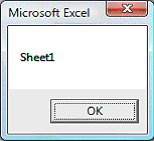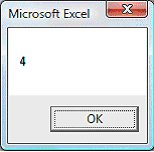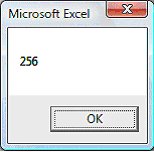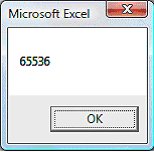[Lesson 18]<<[Table of Contents]>>[Lesson 20]
19.1 The Worksheet Properties in Excel 2010 VBA
Similar to the Range Object, the Worksheet has its own set of properties and methods. When we write Excel 2010 VBA code involving the Worksheet object, we use Worksheets.
Some of the common properties of the worksheet are name, count, cells, columns, rows and columnWidth.
Example 19.1
Private Sub CommandButton1_Click() MsgBox Worksheets(1).Name End Sub
Running the code will produce a pop-up dialog that displays the worksheet name as sheet 1, as shown in Figure 19.1.

Figure 19.1
The count property returns the number of worksheets in an opened workbook.
Example 19.2
Private Sub CommandButton1_Click() MsgBox Worksheets.Count End Sub

Figure 19.2: The runtime screen
Example 19.3
The count property in this example will return the number of columns in the worksheet.
Private Sub CommandButton1_Click() MsgBox Worksheets(1).Columns.Count End Sub
The output is shown below:

Figure 19.3
Example 19.4
The count property in this example will return the number of rows in the worksheet.
Private Sub CommandButton1_Click() MsgBox Worksheets(1).Rows.Count End Sub

Figure 19.4
19.2 The Worksheet Methods
Some of the worksheet methods are add, delete, select, SaveAs, copy, paste and more.
Example 19.5
In this example, when the user clicks the first command button, it will add a new sheet to the workbook. When the user clicks the second command button, it will delete the new worksheet that has been added earlier.
Private Sub CommandButton1_Click() Worksheets. Add End Sub Private Sub CommandButton2_Click() Worksheets(1).Delete End Sub
Example 19.6
The select method associated with worksheet lets the user select a particular worksheet. In this example, worksheet 2 will be selected.
Private Sub CommandButton1_Click() ‘Worksheet 2 will be selected Worksheets(2).Select End Sub
The select method can also be used together with the Worksheet’s properties Cells, Columns, and Rows as shown in the following examples.
Example 19.7
Private Sub CommandButton1_Click() ‘Cell A1 will be selected Worksheets (1).Cells (1).Select End Sub
Example 19.8
Private Sub CommandButton1_Click() ‘Column 1 will be selected Worksheets (1).Columns (1).Select End Sub
Example 19.9
Private Sub CommandButton1_Click() ‘Row 1 will be selected Worksheets (1).Rows (1).Select End Sub
Excel VBA 2010 also allows us to write code for copy and paste. Let’s look at the following Example:
Example 19.10
Private Sub CommandButton1_Click() ‘To copy the content of a cell 1 Worksheets(1).Cells(1).Select Selection.Copy End Sub Private Sub CommandButton2_Click() ‘To paste the content of cell 1 to cell 2 Worksheets(1).Cells(2).Select ActiveSheet.Paste End Sub





